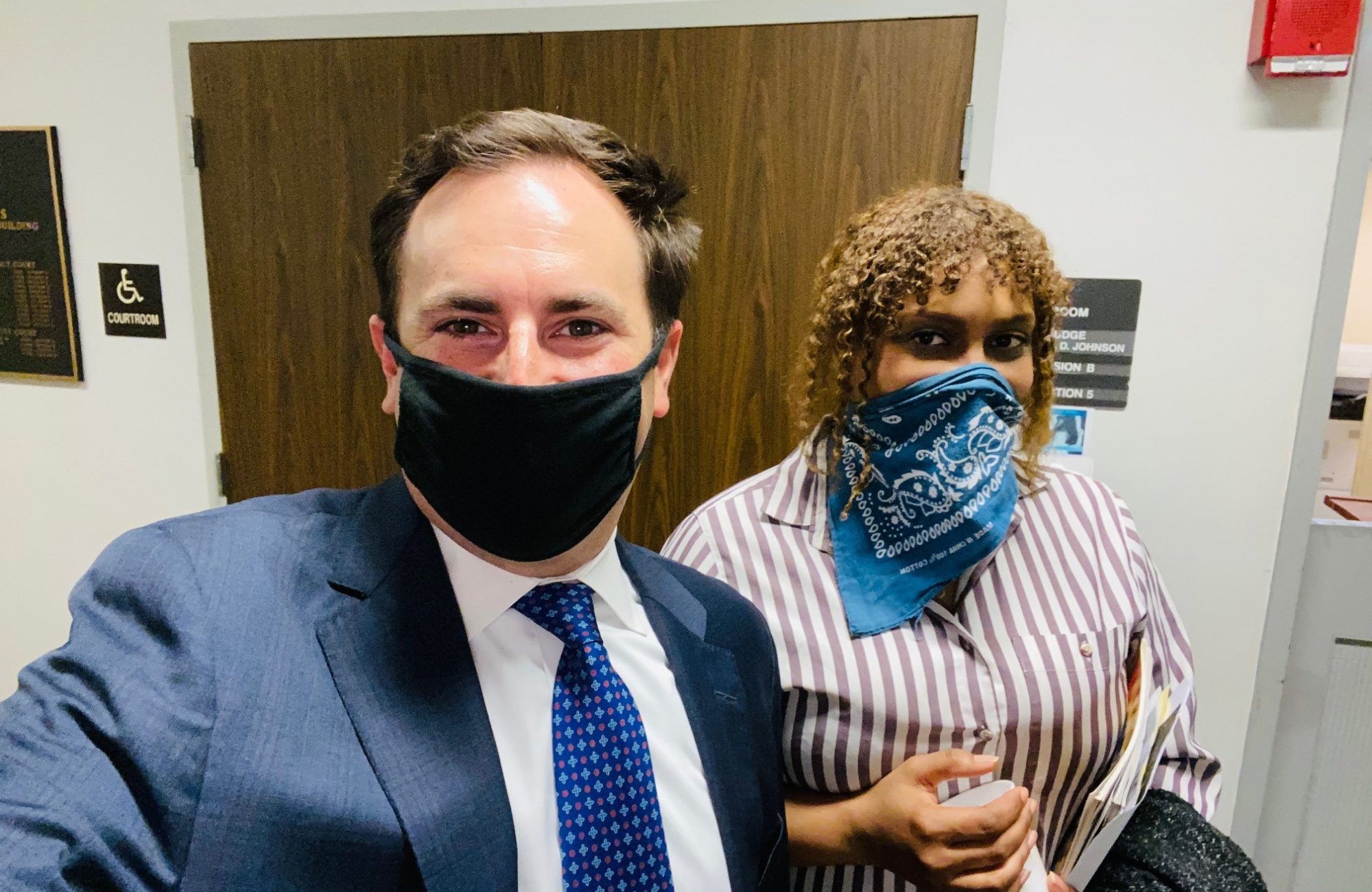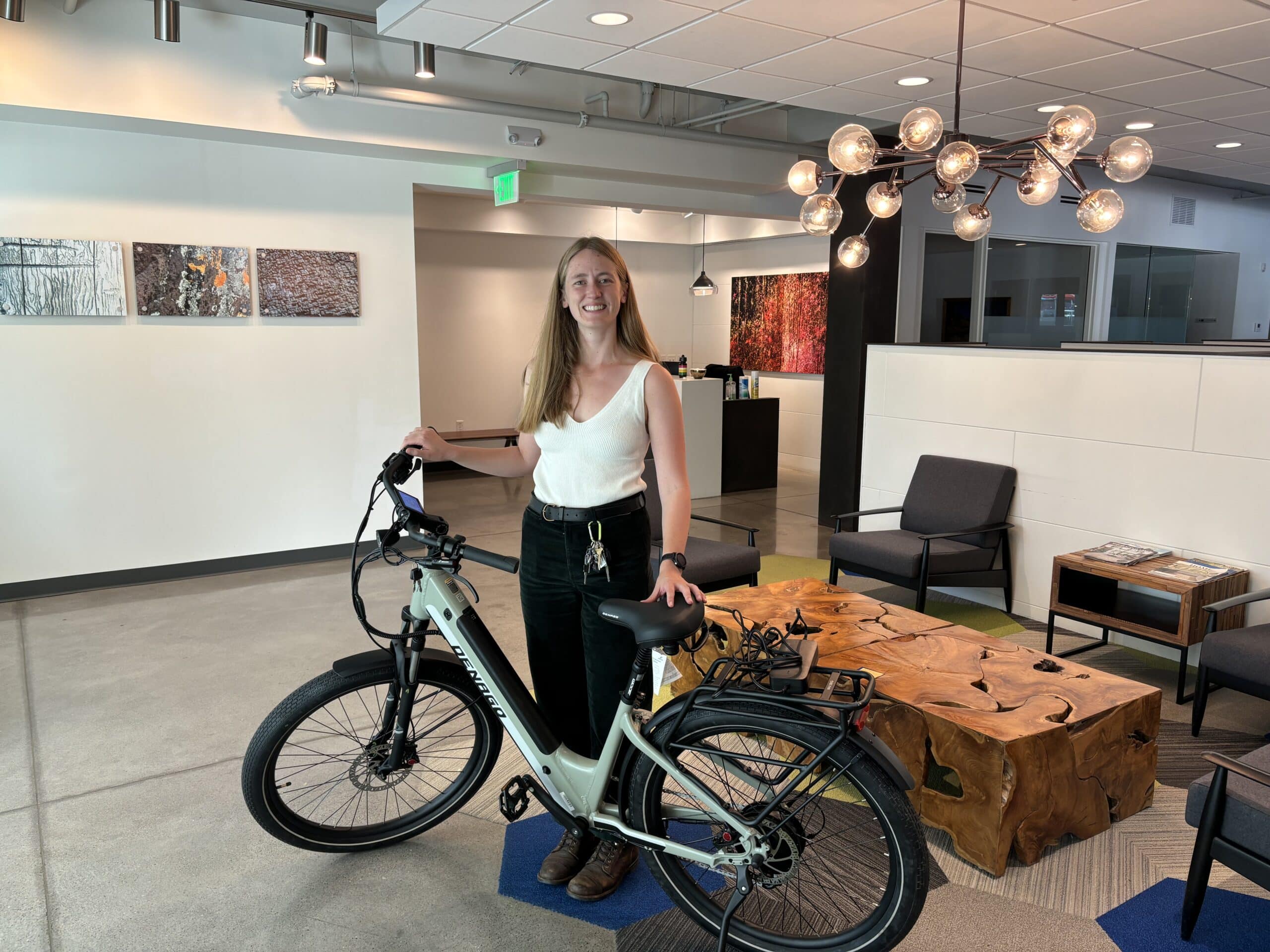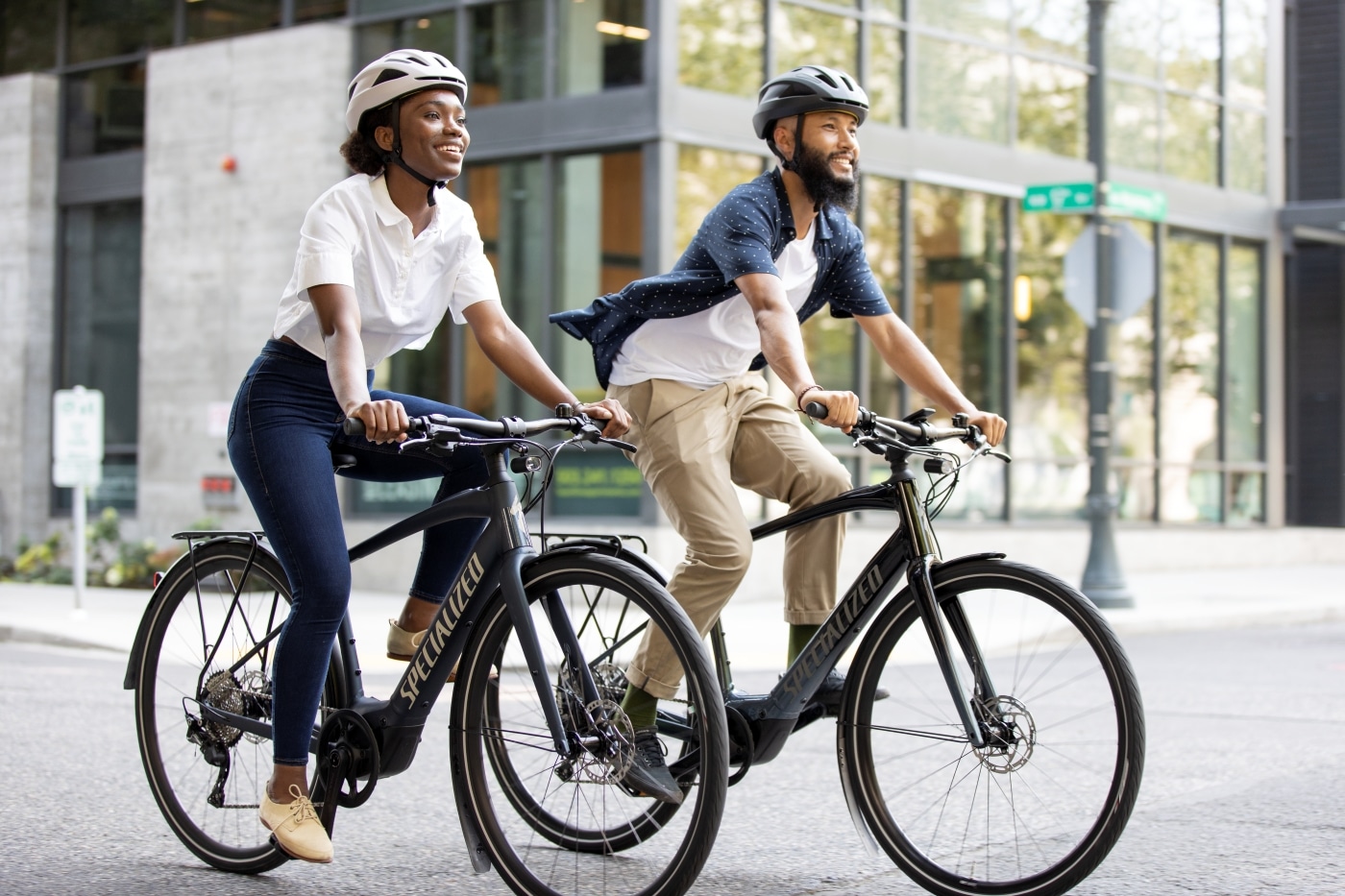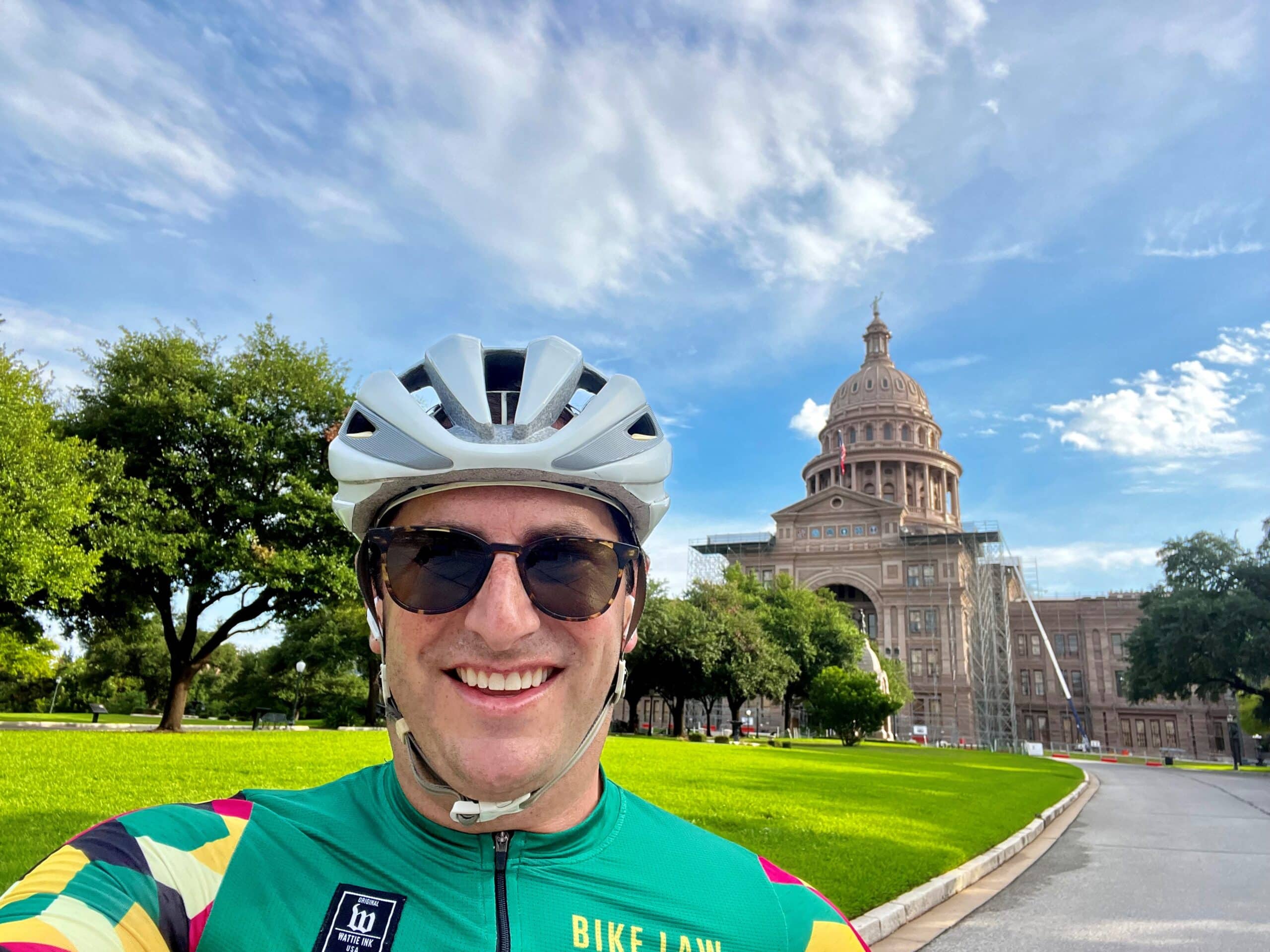Louisiana has the first trial verdict assigning 100% fault to the passenger who did the dooring and 0% fault to bicyclist who was doored.
Buena Batiste did not plan to be “doored.” She was knocked off her bike by a car door and then yelled at by the woman who opened it.
Fortunately, we were able to take Buena’s dooring case to trial and win. And in doing so, we set a new precedent for bicyclists who suffer a dooring in Louisiana because, for the first time, Louisiana has an official trial verdict assigning 100% fault to the passenger/driver who did the dooring and 0% fault to bicyclist who was doored.
Why this Dooring Trial Victory Matters
This matters because, in our other dooring cases in the future, we will be able to argue that bicyclists are not at fault when they are blamed for why such a crash happened. Ken McLeod of the League of American Bicyclists succinctly sums up the reason for this traffic principle: “Dooring laws provide a relatively clear rule to assign responsibility to what some people might see as an unavoidable accident – an opened door hitting or being hit by passing traffic.
These laws put the responsibility for opening vehicle doors on the person opening the door, rather than the people passing their vehicle. They provide a clear incentive for people to look for oncoming traffic – whether bikes, cars, or pedestrians – before opening their door. Without this type of law, bicyclists and other people in traffic have to show that they could not avoid an opening or opened door in order to recover for injuries caused by the open door.” Forty states currently have a dooring law, including Louisiana.
Buena’s Dooring
On the morning of Buena’s dooring, she pedaled through the Warehouse District in New Orleans. She was on S. Peters Street coming up to the intersection with Poydras Street. She was riding on the right-hand side of the road in a lane that had “sharrows” painted on the ground. Buena was heading from her Uptown home to the French Market, where she sold her children’s books she wrote.
Street ViewBuena was used to being passed by cars on her commutes. Before graduating from Columbia University and moving back to Louisiana, she commuted by bike in New York City. Buena’s goal was to get around safely and be aware of her surroundings (and have her surroundings notice her, too). That’s why she wore a helmet and had put a handlebar-end mirror, lights, and fenders on her bike. In short, she should have been all set for safe commutes in New Orleans.
A dark sedan then passed on Buena’s left. The car stopped just ahead of her. She continued riding and started to pass the car on its right. As she went to pass, the passenger opened the front door directly in front of her. The edge of the door caught Buena on her left shoulder, arm, and leg, throwing her to the right into a parked car.
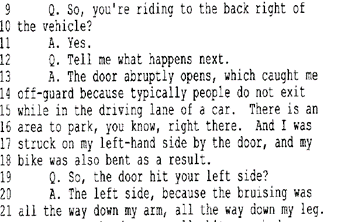
Then, as she put it, Buena was in a state of shock just trying to figure out what happened and what to do now.
But what happened next is the woman who doored Buena got out and started yelling at her. The woman accused Buena of “not being hurt” and insinuated that the dooring was also her fault. In Buena’s own words:
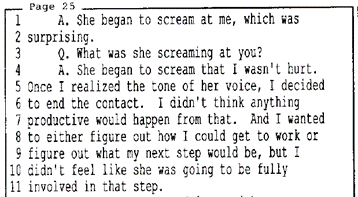
An officer from the New Orleans Police Department responded to the scene, but he did not write a report (we encourage anyone in a similar situation to insist on the officer issuing a crash report, which is required by law whenever there is a crash with an injury). Buena traded information with the driver and passenger, taking pictures of driver’s licenses and their insurance card. Some nearby construction workers helped straighten Buena’s front wheel so her bike could roll, and Buena made it home from the crash scene with the help of a Good Samaritan driver.
Once she got home, she walked inside, realized the emotional toll the morning’s events had taken on her, and burst into tears. She was banged up, but also thankful she wasn’t more seriously hurt.
That’s when the real fight started.
Insurance Company Blames HER for the Dooring
Buena made a claim with the insurance company that insured the sedan. In any insurance claim, liability for the crash is one of the first issues an insurance company will assess. The Allstate adjuster listened to Buena say what happened and then assessed 50% of the fault of the dooring on Buena and discounted her injuries.
At that point, Buena reached out to me (and I agreed to take her dooring case). Her injuries were not severe, but Allstate was not treating her fairly and I wanted to help. As anyone who knows me can tell, I don’t like when people are bullied.
It took Buena six months to recover from her injuries, and Allstate refused to offer anything fair to resolve the case. So, we filed a lawsuit against Allstate and the car’s passenger and driver. Allstate still refused to come to the table with any reasonable offer. We set the case for trial before Judge Rachael Johnson in Division B of Orleans Parish Civil District Court. Judge Johnson has been on the bench for several years and was considerate enough to allow us to take this case to trial before her during the pandemic. All precautions were followed.
The Dooring Trial
On the morning of the trial, Buena met me at my office. We walked across Poydras Street to the courthouse and were ready to proceed for our 9 a.m. start. I suspected Allstate’s attorney would be towing the party line and trying to stick as much fault for the dooring on Buena as he could while simultaneously downplaying her injuries and what she went through in the dooring crash and afterwards. Judge Johnson then walked into the courtroom, called the case for trial, and we began.
I called Buena to the witness stand and asked her to walk us through what happened on the morning of the crash. She testified that the car door opened right in front of her and that there was no time for her to take any evasive action. She explained in the aftermath that she just wanted to get her bike fixed so she could go back to work the day after the crash. Buena said she knew she had to get her bike to the shop to have it repaired the same day, and she went to get checked out for her injuries at an urgent care after tending to her bike’s damage.
Allstate seized on this to try and show that she wasn’t very hurt. But Buena faced a common catch-22: She could take care of her bike and delay tending to her injuries, or she could take of herself and delay tending to her bike. In the first scenario, her injuries might not look serious enough, and in the second, she may not have been able to return to work as quickly as possible.
In 2017, a dooring case was taken to trial in Louisiana (not by me or my law firm). In that case, a bicyclist was riding on Burgundy in the French Quarter when a hotel valet opened his door in front of her and caused her to crash. This verdict resulted in 30% fault on the bicyclist and 70% fault on the valet driver opening the door. That case was Antippas v. Nola Hotel Grp., LLC, 2017-0798 (La.App. 4 Cir. 2/27/19); 265 So.3d 1212.) Even though the facts of each case vary, anyone who has been doored or had a close call knows how out of your control it is. Even 30% fault (and an accordingly reduced recovery for this fault) seems harsh for a hidden hazard literally flying right into you.
I wanted to come out of this trial with 0% fault on Buena for her own case and to establish a new precedent of no fault on bicyclists in other dooring cases.
Allstate’s attorney continued to hammer Buena while she was on the witness stand. “Why didn’t you simply stop behind the car?,” he asked, because the crash wouldn’t have happened if she had. I had to point out that the crash also wouldn’t have happened if she simply stayed home that morning.
In my closing argument, I showed the Court that Louisiana law (La. Revised Statute §32:283) requires a person to make sure it’s safe to open a car door before actually doing it:
“No person shall open any door of a motor vehicle located on a highway without first taking due precaution to ensure that his act shall not interfere with the movement of traffic or endanger any other person or vehicle.”
I was also able to show the Court that it’s fine under Louisiana traffic laws for a bicyclist to pass a vehicle on the right when sharing a road such as S. Peters. (I also added a few incredulous points such as “How dare she pick herself up and get back to work to make a living!” to highlight the absurdity of Allstate’s argument.)
The Win and the Legal Precedent for Dooring Cases in the Future
Allstate did not score many points with the Court in the trial, which resulted in the Court awarding a verdict of everything we requested. Not only was 100% fault for the dooring assigned to the driver and passenger, but the Court also found Buena to be completely free of fault. The Court also awarded damages of over 18x what Allstate was offering to settle for before trial.
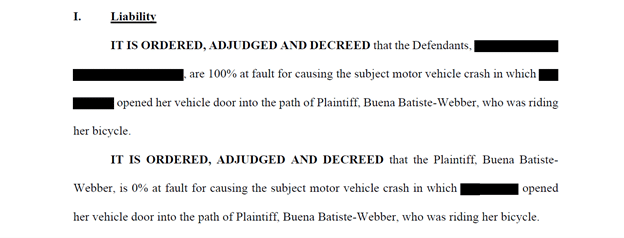
Even though Allstate resisted our positions through the entire case, it was worth it to hang in the fight and pursue a good result. Judge Johnson was instrumental in considering the evidence and law to arrive at a fair verdict. Buena now has the relief of knowing she wasn’t in the wrong and shouldn’t be treated unfairly. Finally, Allstate has again proven that there’s a reason for me to show up to work every day.
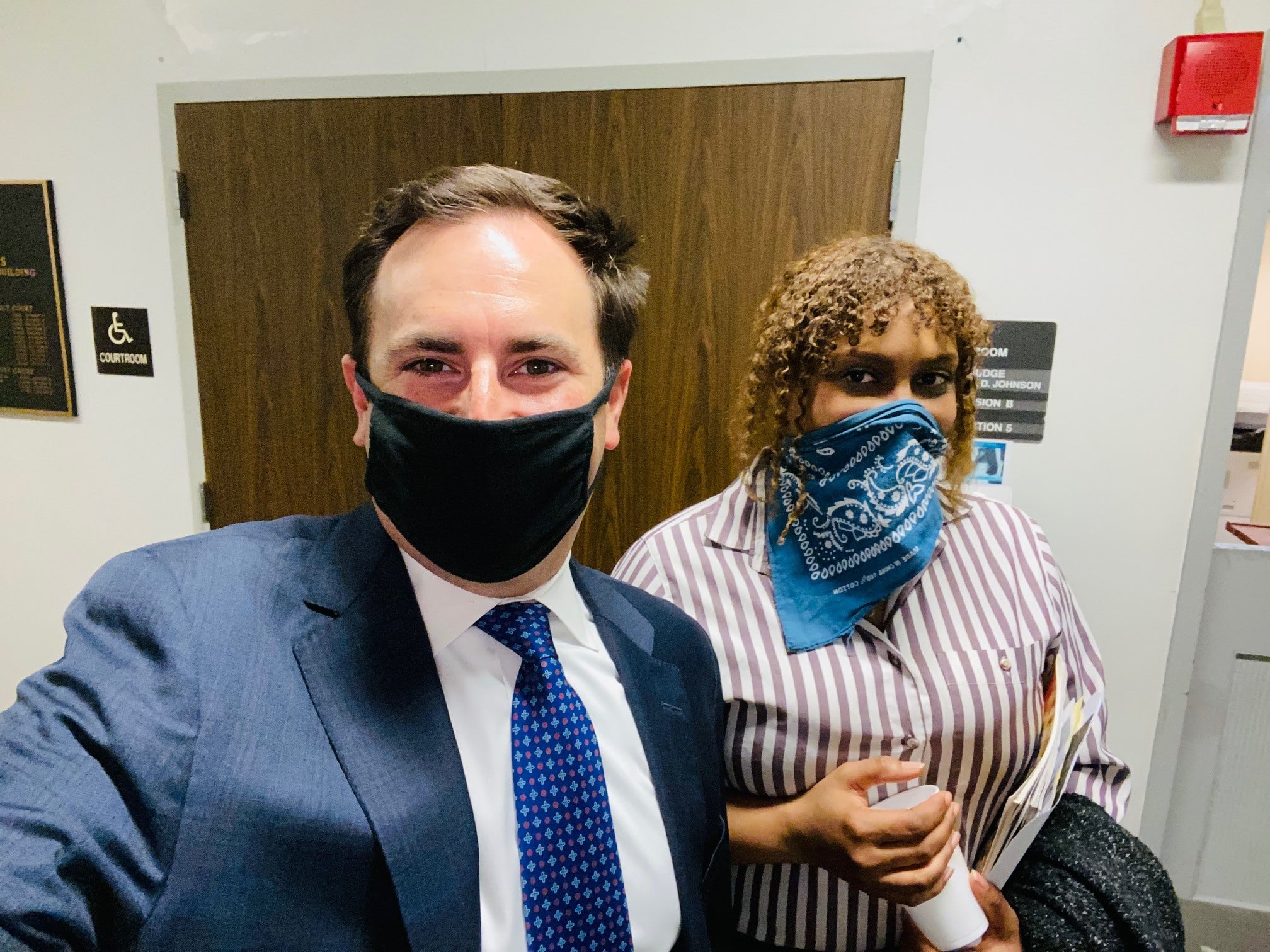
Charlie Thomas serves as the chairperson Bike Easy’s Policy & Design Committee as well as the chairperson of the Louisiana State Law Institute’s Vulnerable Road User Subcommittee. Charlie is also the passionate representative for Bike Law in Louisiana, Texas, and Mississippi. If you would like to hear what else we’re else doing at Bike Law, drop us an email at [email protected] and we’ll add you to our quarterly update list.

Charlie is a bicycle accident lawyer in Louisiana, Texas, and Mississippi and a member of the Bike Law Network.
Having served as the president of the Texas A&M Cycling Team, where he led the team in appearances in the U.S. Collegiate National Championships, Charlie has spent thousands of hours riding his bicycle in Texas.
